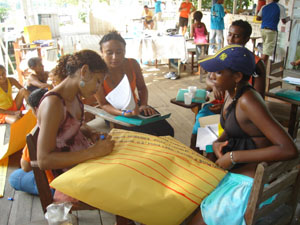Women’s Empowerment in the Amazon

Women in the Amazon rainforest
They live days away from the nearest town. They break nuts, gather fruits, they fish, grow medicinal plants, manioc, açaí; they use coffee to alleviate the pain when they give birth to five, eight, ten children without any medical support; their bodies wear the marks of a life’s hardships, but their faces continue with the smile of young girls. Women of the Amazon.
Forest health
Life in the distant communities of the Amazon rainforest has never been easy to begin with. Ever since the age of colonization, Brazil’s lands and forests have been subject to robbery, exploitation and destruction; its people enslaved, oppressed and killed. When in 1985, Chico Mendes and his companions founded the National Council of Rubber Tappers (CNS), their idea of sustainable use reserves was unheard of, revolutionary and utopian. Chico Mendes died for his ideas in 1989, but today more than 90 so-called extractivist reserves (RESEX) and other sustainable use and protected areas have been created. Agrarian reform and collective land use are part of the country’s development strategy. And yet, leaders of forest communities continue to fear for their lives as loggers and land grabbers go free despite their crimes. Even those forest dwellers that have succeeded in establishing a legal reserve face many hardships. Lack of transport, lack of schools, lack of health posts, and lack of communication constitute the biggest challenges for the extractivists.
Women’s health
Women bear the brunt of this burden, being responsible for the well-being of their families and facing discrimination and gender violence on top of this. Many women still die during child birth for lack of medical accompaniment. Others die from colon cancer without ever having received treatment. Because there isn’t any or because their husbands forbid them to go, claiming that they are the only ones to be allowed to look at them. Some are made to have sex with their husbands within a week of giving birth to a child – his desires dominate everything.
The Forest women’s baggage
Things have begun to change in 2000, when leaders of the Women's Secretariat of the National Council of Rubber Tappers took the initiative and started the project “The Baggage of the Forest Women.” With little resources, lots of patience and a huge amount of energy and creativity these women started educating their sisters on health issues, prevention of DST and HIV and family planning. They traveled days in boats, busses and on foot to reach the most distant communities. In wooden huts, on the river shore, under the trees and in their homes they gathered the families to speak about the female body, reproductive health and the correct use of condoms. Inventing games, speaking the simple and colorful language of the forest people, they built bridges, tore down barriers and convinced men and women of the importance of reproductive health for a happy family and community life. Slowly, patiently they’ve won over the communities’ confidence and have begun to talk about women’s rights as well. In the forest, nothing works without the men, so they have to be included in every meeting so to not scare them with “feminist” activities.
A Forest methodology
Any form of training, project development and implementation or any other activity in the Extractive Reserves of the Amazon, in order to achieve its objective, must follow the logic of collective thinking and organization. Gender is no exception. It is impossible to organize a seminar or meeting, for example, and invite only women. The fear of anyone dividing the communities is great among both men and women. Therefore, the Baggage applies a collective approach, inviting the entire community (women, men, children, the elderly) and advocates women’s rights within the context of gender, that is, a benefit for all members of the communities. An important element of the campaign to raise awareness about women’s rights and gender is the participation of male leaders who promote gender equality and an end to violence against women. This way, more and more men support their work, are willing to listen and participate. Some men have brought up the courage to consider vasectomy and even talk about it. The respect for women is growing. The project’s participatory approach, accessible language and variety of educational material are now featured in an educational video, which was launched in 2008. “The Baggage of the Forest Women” won the ActionAid Pan-American Award and has been a major success with its very constituency as it uses forest legends, local language and shows much respect to traditional customs (so far as those do not infringe on women’s rights and well-being).
Strengthened by the success, the Women’s Secretariat is now entering the highly competitive field of production, commercialization and financial control with another project to strengthen female productive groups in the Amazon and develop a marketing strategy focussing on Female Fair Trade.


